Shown here, a miner mixing gold and mercury by hand. This is a typical sight at non-Fairtrade Gold mines. Photo by author.
At a Glance:
* The use of recycled gold has symbolic meaning, and raises the awareness of sourcing issues among consumers. But it has no impact whatsoever on the mining industry.
* Fairtrade Gold practices ensure small-scale miners are paid fairly for their work. They also enable you (the consumer) to wield your economic power to benefit the most responsible small-scale mining operations in the world.
Fairtrade Gold vs Recycled Gold
Fairtrade Gold outweighs recycled gold, ethically-speaking.
Recycled and vintage jewelry often dominate discussions around 'ethical' jewelry. This is great for raising the issue of sourcing—however, these options are not as ethical as they are perceived to be. If the goal is to elicit lasting change in the jewelry industry, which has been steeped in exploitation, we must explore other options.
Here, we'll demonstrate that Fairtrade Gold is more ethical than recycled gold. We'll do so by breaking down the term 'ethical' into environmental aspects and humanitarian aspects, and comparing the effects of Fairtrade and recycled gold on each.
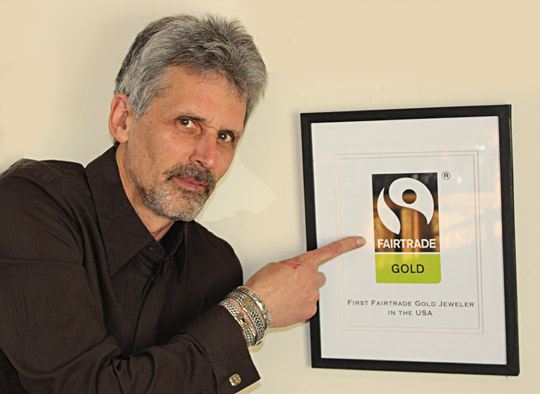
Marc Choyt, President and co-owner of Reflective Jewelry, poses with our Fairtrade Gold certification.
But First, Some Background on Recycled Gold
Recycling, as a concept, is nearly synonymous with 'eco-friendly.' It's the very foundation of many of our ideas around environmentally-friendly practices and often the baseline to which all other tactics are compared. And generally, it is a very effective process that genuinely does benefit the Earth and its inhabitants.
However, it's a simple fact that recycling precious metals (like gold) is not the same as recycling plastic bottles or aluminum cans. To put it baldly, using recycled gold has absolutely no environmental or humanitarian benefits.

Recycled gold does not change the realities of gold mining, because it has no effect on gold mining whatsoever.
Not convinced? Let's break it down.
Recycled Gold: The False Thinking
Recycling works by reducing demand for materials— which in turn decreases production of them. When you recycle a plastic water bottle, you're feeding that plastic back into the supply chain. Rather than send it to a landfill and create demand for companies to produce another to take its place, the bottle is broken down and re-used. It essentially becomes another water bottle!
This same process cannot be applied to gold. Demand for gold is so high that it can likely never be reduced to a point where people stop mining it. Think of it this way: Due to the immense value of precious metals, it will always be worth somebody's effort to dig them out of the ground. This mining will never stop, no matter how much recycled gold is used. As long as humans roam this planet, some of them will be mining gold.
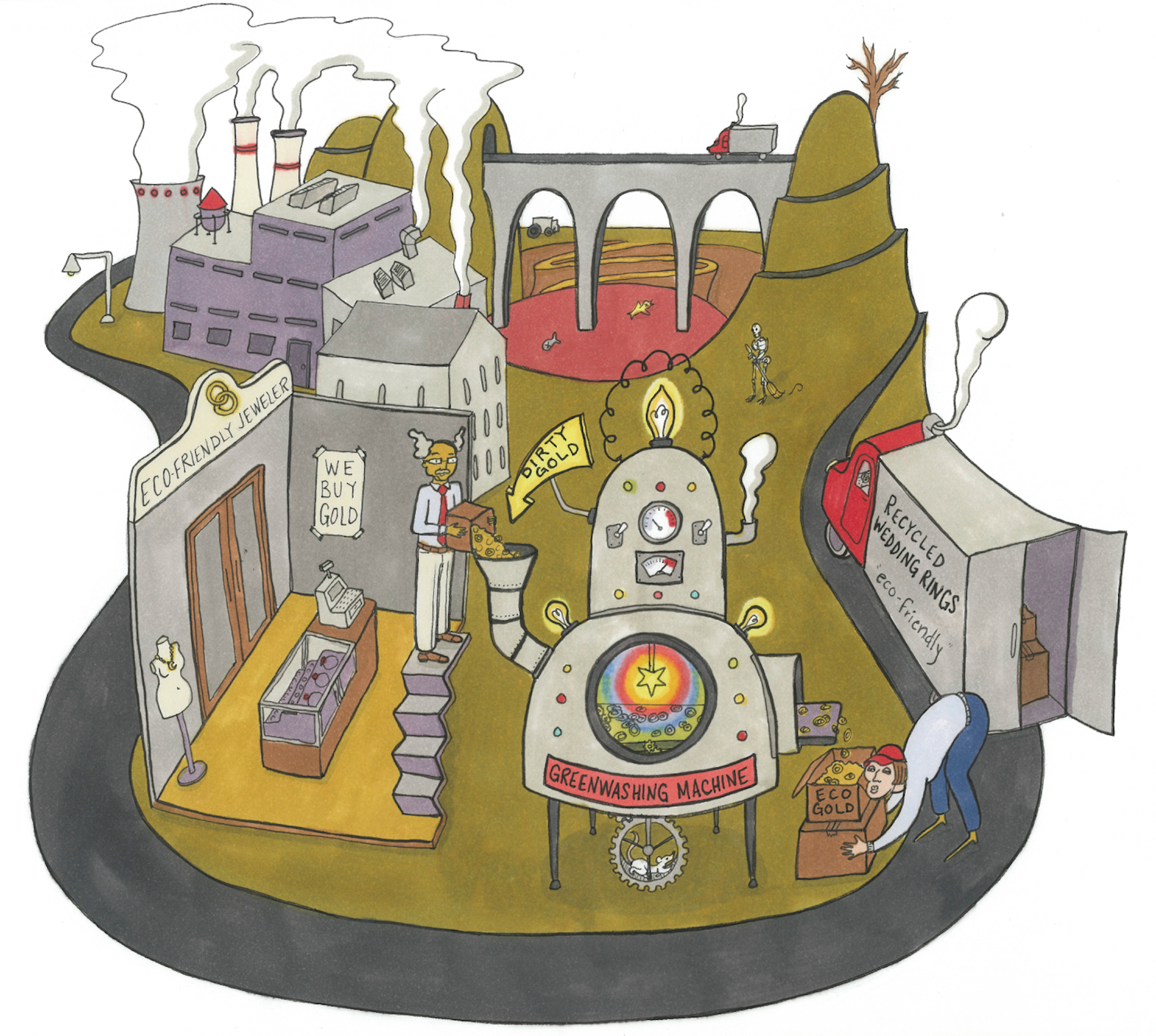
As shown in this graphic, recycled gold is merely dirty gold, greenwashed and rebranded as "ethical" recycled gold.
The notion that recycled gold has any positive environmental or humanitarian impact is in reality a cleverly-contrived marketing ploy. These assertions are designed to mislead consumers, to obfuscate the issues and lure us into a false sense of complacency.
Ironically, when jewelers attempt to capitalize on the associations of terms like 'recycled’ and piggyback on eco-friendly and ethical product movements, they undermine any lesser-known efforts that have real potential to elicit change. An honest re-evaluation of jewelry sourcing would profoundly improve the lives of small-scale miners around the world.
Environmental Effects of Recycled Gold vs Fairtrade Gold
Gold is mined by both large-scale mining companies and independent artisanal and small-scale (ASM) miners. The latter group makes up about 90% of this industry's workforce, while generating only around 20% of total gold mined. These are some of the most impoverished people on the planet—people who work themselves to the bone day-in and day-out just to feed their families. Often, they labor in remote conditions—meaning they lack access to things like safety equipment and healthcare. Without proper channels to sell their gold, they are at the mercy of middlemen who can travel to them—leaving the door wide-open for exploitation.
The vast majority of the time, ASM miners use mercury in the process of mining gold. If not handled safely, mercury can cause a host of neurological disorders and conditions—and can lead to death. Unfortunately, most ASM gold miners lack either the resources or knowledge to handle mercury properly. They mix gold and mercury by hand—in the same pans they will later use to cook dinner for their children. They burn off mercury inside their own kitchens, releasing the neurotoxin methylmercury into their own, unprotected lungs.
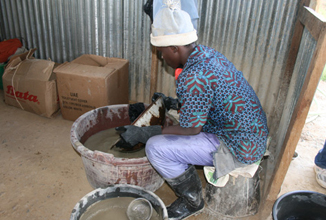
In Fairtrade Gold mines, safe methods are employed to prevent human contact with mercury.
All this is aside from the unlined, earthen pits that leech mercury into groundwater—and the inevitable spills that dump huge quantities of mercury into streams. This mercury pollution can remain in waterways for centuries, poisoning entire ecosystems.
When Fairtrade practices are implemented at an ASM gold mine, miners are educated about the dangers mercury poses to themselves, their children, and the greater environment. To begin, they are taught safe methods of handling mercury. Further down the line, Fairtrade works with miners to eliminate the use of mercury (or cyanide, another chemical commonly used) altogether. Gold produced without these chemicals is classified as 'Eco-Gold', and it generates increased premiums for these ASM mining communities.
Humanitarian Aspects of Fairtrade Gold vs Recycled Gold
We've shown how Fairtrade Gold practices reduce the amount of mercury released into the environment. But what about the humanitarian side of things?
Recycling gold results in absolutely no humanitarian benefit. As given above, it would be virtually impossible to decrease demand for gold to the point where mines stopped operating. The best thing we can do is push initiatives that directly benefit these miners, rather than skirt the issue and pat ourselves on the back.
Fairtrade Gold ensures that miners receive a fair wage for their work. It also brings benefits already discussed—such as safety equipment and training. In addition to all this, mining communities receive a premium of $2,000 per ounce of gold mined. This money is used for community projects like building schools or hospitals.
Essentially, Fairtrade Gold gives miners an opportunity to improve their daily lives. It provides hope for the future by shining a light on the end of the tunnel that is the vicious cycle of poverty. It also brings an end to environmental degradation, which is a boon for anyone living in said environment.
Our Verdict on Recycled Gold vs Fairtrade Gold
In reality, gold and silver have always been recycled by jewelers—unlike post-consumer waste. Recycled metals are, in fact, available to any jeweler. Just consider that most jewelers (and pawn shops!) will purchase unwanted jewelry from their customers.
The use of recycled metals is symbolic at best. At worst, it lends credence to the co-opted and patently false idea that these materials are somehow 'ethical'. It allows a person or company to 'wash their hands' of the situation without making any progress whatsoever toward lasting, meaningful change for producer communities.
Moving Forward
So how exactly do we evoke this lasting, meaningful change? By supporting efforts that stand on a solid, ethical ground— efforts like Fairtrade Gold.
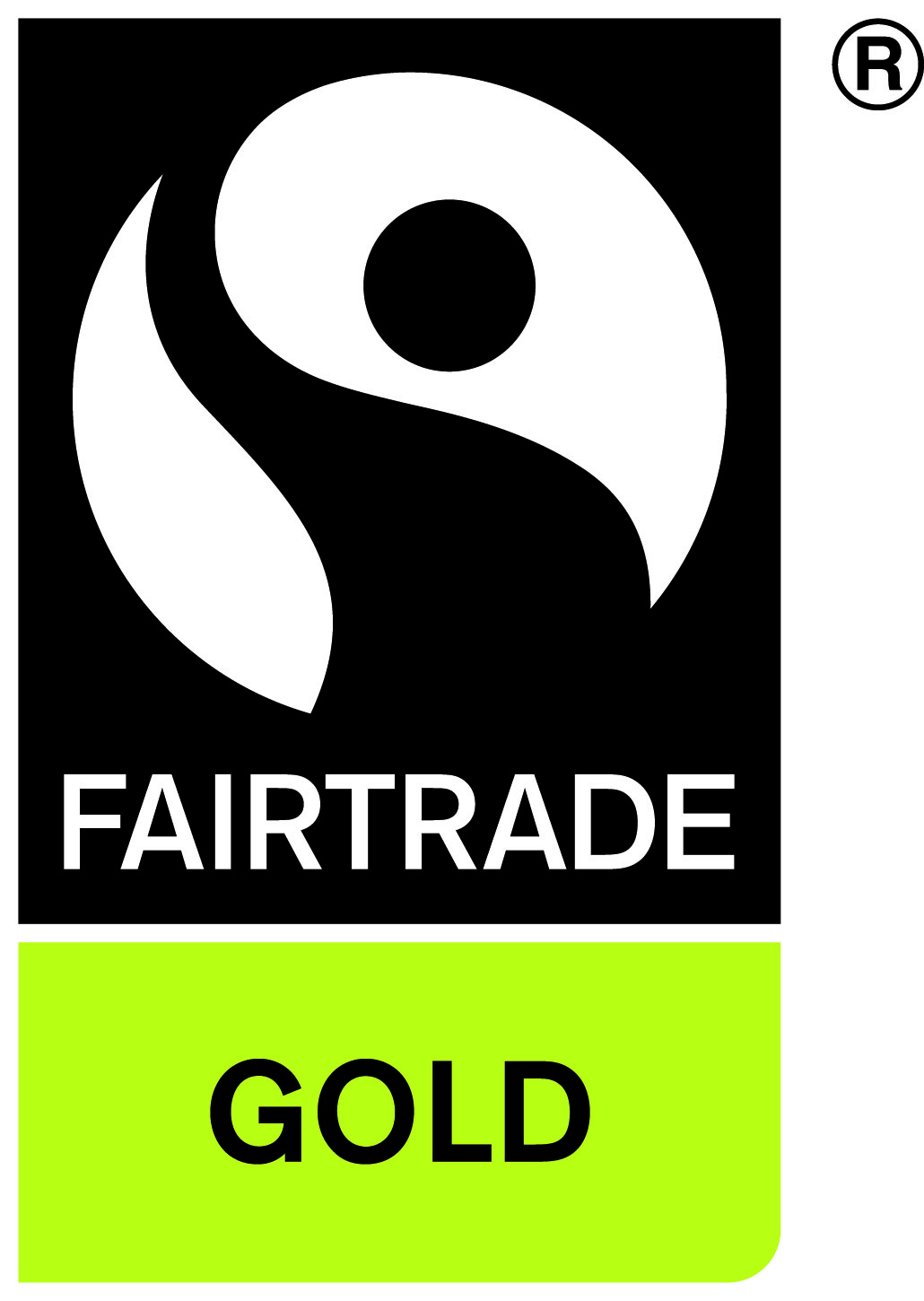
The Fairtrade Gold logo.
You can make a difference. Every purchase strengthens the supply chains necessary for these programs to grow. If the US consumer market were to move toward Fairtrade Gold as it has toward Fairtrade coffee, hundreds of thousands of small-scale miners would reap the benefits of increased income, access to education, and access to healthcare.
About Our Ethics
We are firmly against all large-scale multi-national precious metal mining, and even initiated and co-led a campaign against a large gold mine outside our home of Santa Fe. Too often, gold mining exploits local communities, destroys ecosystems, and displaces indigenous people. While large-scale mining is the politics of greed, ASM mining is the politics of bread.
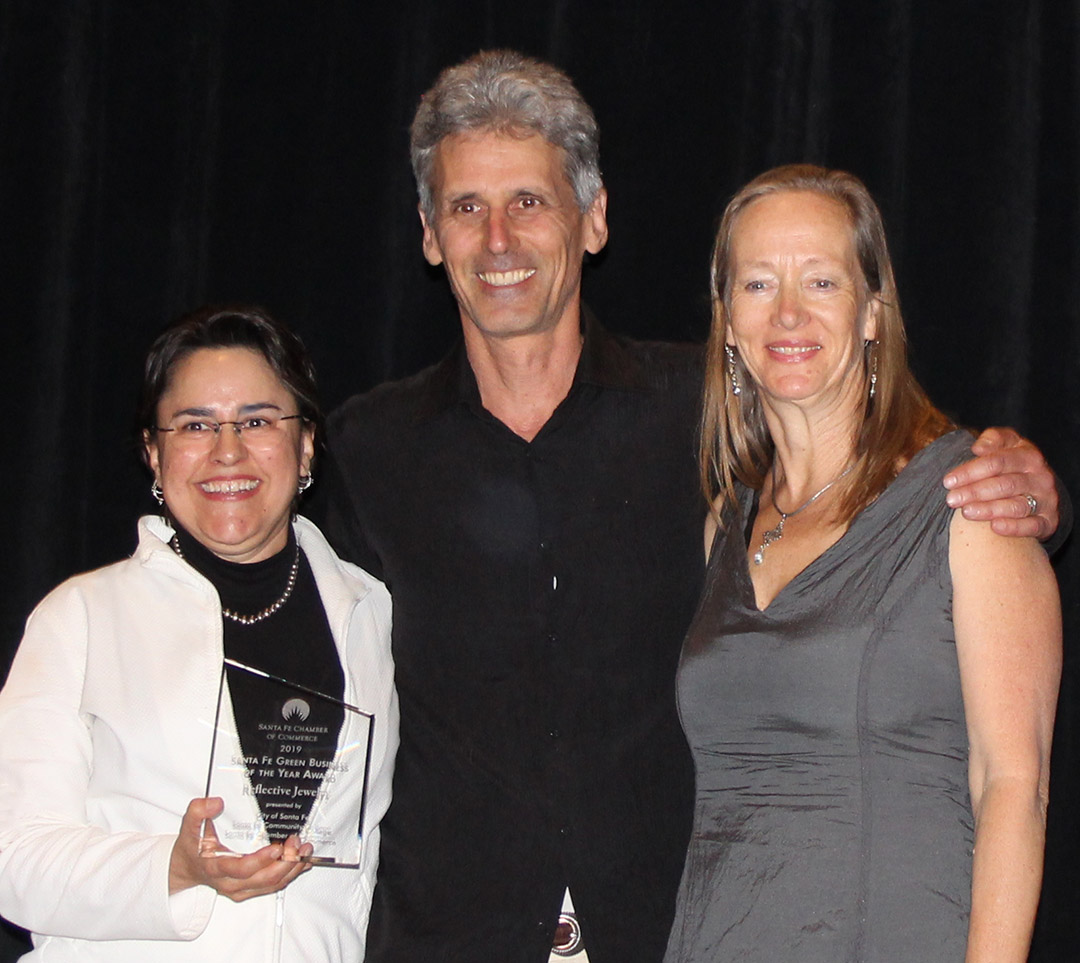
Reflective Jewelry was named Santa Fe, New Mexico Green Business of the Year 2019. Details here.
We understand that recycled gold is most often the only ethical option available to jewelers. This was true for us before becoming the first certified Fairtrade Gold jeweler in the US. Even today, many of our products are made using recycled gold. As of July 2017, certain jewelry components (mill products such as gold wire and sheets) necessary for jewelry production are simply not yet available to the US in Fairtrade Gold.
Marc Choyt is president of Reflective Jewelry, a designer jewelry company founded in 1995. He pioneered the ethical sourcing movement in North America and is also the only certified Fairtrade Gold jeweler in the United States. Choyt’s company was named Santa Fe New Mexico’s Green Business of the Year in 2019, and he has been honored with several awards for his efforts to support ethical jewelry. His ebook, Ethical Jewelry Exposé: Lies, Damn Lies and Conflict Free Diamonds, is available online. Choyt can be reached on Twitter at @Circlemanifesto or by email at marc(at)reflectivejewelry.com.